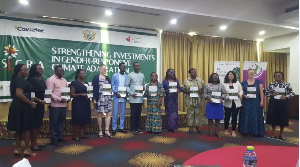 The project is being implemented by Cowater International in partnership with GoG
The project is being implemented by Cowater International in partnership with GoG
The Strengthening Investments in Gender-Responsive Climate Adaptation (SIGRA) project, a Canadian-funded initiative aimed at improving the resilience of Ghanaian citizens through increased investments in inclusive and gender-responsive climate adaptation initiatives, has been launched in Accra.
The US$10 million project is being implemented by Cowater International in partnership with the Government of Ghana through six key central-level Ministries, Departments, and Agencies (MDAs). It aims to promote transparency, accountability, and inclusion, fostering collaboration between women-led CSOs and all levels of government in planning and executing climate adaptation investments. Approved by Global Affairs Canada (GAC), it aligns with its Feminist International Assistance Policy (FIAP).
The project launch and learning forum introduce SIGRA to key stakeholders, serving as a platform for exchanging knowledge on gender-responsive climate adaptation initiatives. Successful implementation is expected to directly improve the resilience of 627,000 of the country’s citizens, including 320,000 women and 307,000 men, against the effects of climate change, while indirectly supporting up to 5 million people in its Northern and Volta Regions.
GAC’s Deputy Director, Louise Paris, in her opening remarks at the forum, noted that the project responds to the mutual commitments of both countries to address environmental and climate change issues as expressed in SDG 13.
She added that by integrating gender considerations into its adaptation strategies, the project will enhance the resilience of communities, particularly vulnerable groups, to the adverse impacts of climate change.
“This project was approved by GAC with a contribution of up to US$10 million to support Ghanaian citizens, particularly women and the most vulnerable groups in building resilience to climate change. As it is being launched today, I wish it a smooth implementation to generate results that will sustain beyond it.
“Climate change is an issue that needs to be tackled at many levels and in a coherent way between those levels. This is why the project is connected to national level actors and plans, while supporting local level planning, delivery and reporting of climate related activities,” she further noted.
Adwoa Fraikue, Chief Economic Officer at the Ministry of Finance (MoF), expressed gratitude to the Canadian Government for its high-level commitment to advancing gender equality and providing space and resources to empower women and girls to reduce vulnerability and enhance resilience in the country.
She noted that while the government’s contributions to climate finance are significant at the national level, they still fall short of meeting the country’s needs, emphasizing the pivotal role of international sources in financing the country’s gender-responsive climate initiatives.
“The provision of climate finance is central to global efforts and at the national level inadequate public funding is one of the key limiting factors holding back the delivery of national gender-responsive obligations in many of our vulnerable communities,” she noted.
Furthermore, she said as the impacts of climate change intensify around the world, adaptation efforts are crucial to ensuring that communities and economies can survive.
Against this backdrop, she indicated that government has taken various actions to support climate change adaptation planning, with a number of climate change-related policies, strategies and interventions already in place.
For instance, she mentioned that her ministry conducted two climate finance studies in 2015 and 2020. The objective was to raise awareness of climate change spending in the country, including gender-responsive spending, and to support the implementation of the national climate change policy, which addresses gender issues.
Additionally, these studies aimed to facilitate the integration of the policy into plans and budgets and to strengthen transparency and accountability over climate change expenditures.
“In 2021 Ghana receive $20 million funding from Green Climate Fund (GCF) for the Affirmative Finance Action for Women in Africa (AFAWA) Program. The objective of the program is to provide below-market rates loans with a longer tenor to enhance rural women access to credit,” she added.
She believes that the inclusion of climate and gender finance sections in the country’s national budget documents demonstrates a growing recognition of the importance of climate-gender finance in its development agenda.
The day’s forum also featured presentations, panel discussions, and interactive sessions to facilitate dialogue and knowledge exchange.